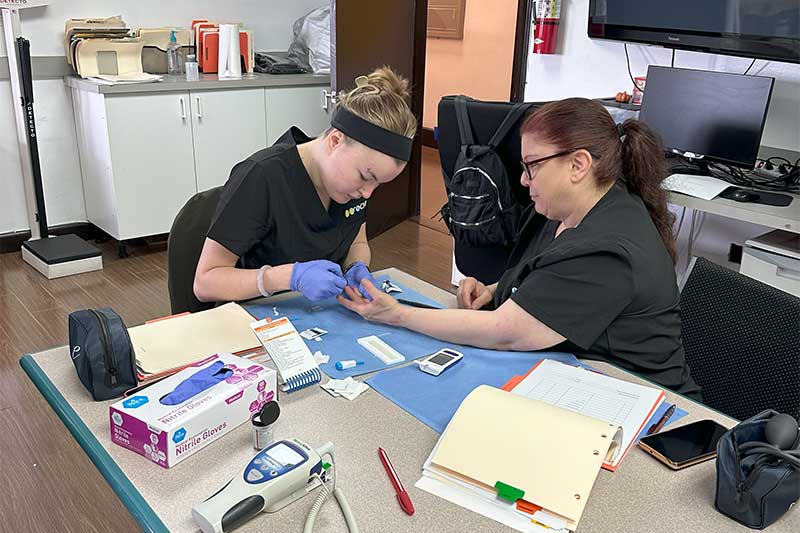Boost your nursing career through continued education. Discover the top 10 advantages of continuing education in nursing. Nurses stand at the forefront of patient care and medical innovation in the rapidly evolving healthcare field. With advancements in medical technology and shifts in healthcare policies, the demands on nursing professionals have grown exponentially. This makes continuing education beneficial and essential in maintaining the highest standards of patient care.
Top 10 Advantages of Continuing Education in Nursing
This blog post will explore the numerous advantages of continuing education for nurses and demonstrate how it is vital to personal and professional growth. Whether you’re a seasoned nurse or just starting your career, you’ll discover how ongoing learning can enhance your skills, open doors to new opportunities, and ultimately lead to greater job satisfaction.
Staying Updated with Medical Advancements
Continuing education in nursing helps professionals keep pace with the latest medical technologies and procedures. In a field where discoveries and techniques emerge regularly, staying updated is crucial. Through continued learning, nurses can become familiar with the latest equipment and treatment protocols, ensuring they provide the best care possible. This knowledge improves patient outcomes and enhances the nurse’s ability to work effectively within a modern healthcare environment.
Additionally, ongoing education allows nurses to specialize in areas of interest. Nurses can provide more specialized care by gaining advanced knowledge in specific fields such as oncology, pediatrics, or geriatrics. This specialization benefits patients and allows nurses to carve out niche areas of expertise, increasing their value within healthcare teams.
Lastly, staying updated with medical advancements helps nurses maintain their professional credentials. Many nursing boards require certain continuing education credits to renew licenses. By fulfilling these requirements, nurses uphold their legal qualifications and demonstrate a commitment to their profession and ongoing improvement.
Enhancing Patient Care Quality
One of the primary benefits of continuing education in nursing is its direct impact on patient care. By staying informed about the latest best practices, nurses can deliver more accurate diagnoses and effective treatments. This ensures patients receive care based on current evidence, leading to better health outcomes.
Furthermore, continued learning equips nurses with advanced communication skills. Effective communication is essential for gathering patient information, explaining treatment plans, and providing emotional support. Nurses can build stronger patient rapport by honing these skills, increasing trust and patient satisfaction.
Continuing education also promotes cultural competence among nursing professionals. With healthcare settings becoming increasingly diverse, understanding different cultural perspectives is vital in providing respectful and personalized care. Educational programs often include modules on cultural awareness, enabling nurses to serve patients from various backgrounds with sensitivity and understanding.
Expanding Career Opportunities
Continuing education opens doors to many career opportunities within the nursing field. By acquiring new skills and knowledge, nurses can qualify for advanced roles such as nurse practitioners, clinical nurse specialists, or nurse educators. These positions often come with increased responsibilities, higher salaries, and greater autonomy.
Additionally, ongoing education can pave the way for leadership roles. Nurses who pursue further studies in healthcare management or administration can transition into managerial positions, steering healthcare teams and influencing hospital policies. This shift broadens career prospects and allows nurses to impact the healthcare system on a larger scale.
Networking opportunities are another advantage of continuing education. Attending workshops, seminars, and conferences allows nurses to meet professionals from different specialties, fostering connections that can lead to collaborative projects, mentorships, and job offers. These interactions enrich the professional experience and can significantly enhance a nurse’s career trajectory.
Increasing Job Satisfaction
Job satisfaction is a critical factor in nursing, and continuing education plays a significant role in enhancing it. By pursuing ongoing learning, nurses feel more competent and confident in their abilities, leading to higher job satisfaction. This confidence translates into a more fulfilling work experience, where nurses derive satisfaction from making a meaningful impact on patients’ lives.
In addition, continuing education provides a sense of accomplishment and personal growth. Acquiring new knowledge and skills can be both challenging and rewarding, contributing to a nurse’s sense of self-worth and achievement. This sense of personal development boosts morale and mitigates burnout, a common issue in the demanding nursing field.
Furthermore, career advancement opportunities linked to continuing education often increase job satisfaction. With new roles and responsibilities come fresh challenges and the excitement of tackling them. Nurses who engage in lifelong learning find joy in their evolving careers, staying motivated and passionate about their work.
Developing Critical Thinking Skills
Critical thinking is essential for nurses, enabling them to analyze complex situations and make informed decisions. Continuing education fosters the development of critical thinking by exposing nurses to diverse scenarios and problem-solving exercises. Through case studies, simulations, and discussions, nurses learn to apply theoretical knowledge to real-world situations, sharpening their analytical skills.
Additionally, ongoing learning encourages reflective practice. Reflective practice involves analyzing one’s experiences to identify strengths, weaknesses, and areas for improvement. By engaging in reflection, nurses become more self-aware and better equipped to adapt to changing environments. This introspective approach leads to continuous professional growth and improved patient care.
Continuing education also promotes evidence-based practice, a critical aspect of nursing that relies on integrating research evidence, clinical expertise, and patient values. By staying informed about the latest research and guidelines, nurses can make decisions based on the best available evidence, ensuring high-quality care and patient safety.
Strengthening Professional Credentials
Maintaining up-to-date credentials is essential in the nursing profession. Continuing education is a key credentialing component, with many nursing boards requiring specific educational hours for license renewal. By fulfilling these requirements, nurses demonstrate their commitment to maintaining high professional standards and staying current.
Additionally, continued learning can lead to specialized certifications. Obtaining certifications in critical care, pediatrics, or gerontology enhances a nurse’s expertise and validates their skills to employers and peers. These certifications can be valuable in advancing one’s career and gaining recognition within the healthcare community.
Professional organizations often offer continuing education opportunities, providing nurses access to resources, networking events, and professional development activities. By engaging with these organizations, nurses can stay informed about industry trends, participate in advocacy efforts, and contribute to the advancement of their profession.
Fostering Lifelong Learning
Continuing education instills a culture of lifelong learning among nursing professionals. By prioritizing ongoing education, nurses cultivate a mindset of curiosity and adaptability, which is essential in the dynamic healthcare environment. This commitment to lifelong learning ensures that nurses remain relevant and prepared to meet future career challenges.
Lifelong learning also encourages personal development beyond professional growth. Nurses can expand their horizons and discover new passions by exploring new topics and interests. This holistic approach to learning contributes to overall well-being and a balanced life, both essential components of a sustainable and fulfilling nursing career.
Engaging in lifelong learning fosters resilience and adaptability. Adapting to new technologies, policies, and patient needs is crucial in a rapidly changing healthcare landscape. By continually updating their knowledge and skills, nurses can confidently face the uncertainties of their profession and thrive in any situation.
Building Leadership and Management Skills
Continuing education plays a vital role in developing leadership and management skills among nurses. Educational programs often cover team dynamics, conflict resolution, and effective communication, equipping nurses with the tools to lead healthcare teams effectively. These skills are invaluable for nurses aspiring to take on leadership roles and influence healthcare delivery.
Furthermore, continued learning provides nurses the knowledge to advocate for patients, colleagues, and the nursing profession. Nurses can participate in decision-making processes and contribute to shaping healthcare systems by understanding healthcare policies and regulations. This involvement enhances professional development and empowers nurses to drive positive change.
Developing leadership skills through continuing education fosters a sense of responsibility and accountability. Nurses who engage in leadership training become role models for their peers, inspiring others to pursue excellence in patient care. This collaborative and supportive environment leads to improved teamwork and a stronger healthcare community.
Improving Interdisciplinary Collaboration
In today’s healthcare landscape, interdisciplinary collaboration is essential for comprehensive patient care. Continuing education promotes collaboration by exposing nurses to various perspectives and disciplines. By participating in interdisciplinary workshops and seminars, nurses learn to appreciate the unique contributions of other healthcare professionals and strengthen their teamwork skills.
Ongoing learning also encourages nurses to engage in collaborative research and projects. Nurses can contribute their expertise and gain new insights by working alongside colleagues from different fields, leading to innovative solutions and improved patient outcomes. This collaborative approach enhances professional development and fosters a sense of camaraderie and shared purpose.
Continuing education programs often include opportunities for networking with professionals from diverse backgrounds. By building connections with other healthcare providers, nurses can exchange ideas, best practices, and resources, ultimately enriching their practice and enhancing patient care.
Enhancing Cultural Competence
Cultural competence is a critical aspect of nursing that ensures patient-centered care. Continuing education programs often incorporate modules on cultural awareness, enabling nurses to understand and respect their patients’ diverse backgrounds. By gaining cultural competence, nurses can provide personalized care sensitive to patients’ beliefs, values, and preferences.
Cultural competence also enhances communication between nurses and patients. Nurses can effectively convey information and build trust with patients from various backgrounds by understanding cultural differences in communication styles. This improved communication leads to better patient outcomes and increased patient satisfaction.
Ongoing learning opportunities like workshops and seminars allow nurses to engage with diverse perspectives and experiences. By participating in these programs, nurses can continuously improve their cultural competence, ensuring they provide inclusive and equitable patient care.
Conclusion
Continuing education in nursing offers a wealth of benefits, from enhancing patient care quality to expanding career opportunities. Nurses can thrive and provide exceptional care by staying updated with medical advancements, improving critical thinking skills, and fostering lifelong learning.
The pursuit of continuing education empowers nurses to take control of their careers, adapt to the evolving healthcare landscape, and make a meaningful difference in the lives of their patients. Numerous resources and programs are available for those seeking to explore further, offering opportunities for professional growth and development.
Whether you’re a seasoned nurse or just beginning your career, investing in continuing education is vital to achieving personal and professional success. Keep learning, stay curious, and continue to impact the world of healthcare positively.




